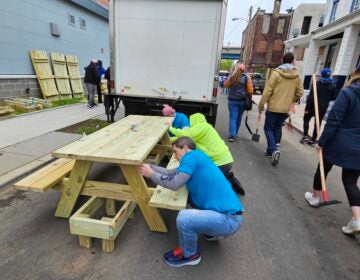Embracing a culture through oral storytelling
The Roxborough branch of the Philadelphia Public Library honored Black History month this week in a medium that is becoming less and less common – oral storytelling.
Carla Wiley, of the storytelling group Keepers of the Culture, told African American folk stories and fables to an audience of all ages.
Wiley kicked off the performance by introducing herself in Kiswahili saying “Hello family” to the fifteen people who had gathered in the library.
She asked the audience to address her by the honorific title “Mama” explaining that “Mama means you’re at the age of elderhood. I waited a long time to be an elder.”
Between stories – and jokes – Wiley taught Kiswahili words and drew from her own life to explain the history and modern importance of storytelling.
In the “call and response” tradition Wiley told the famous myth on Anancy, the West African trickster, while the audience helped her to the create sound effects of elephants walking and rocks crashing to the ground.
Audience participation, she explains, indicates that people are learning social and verbal skills, and helps us to remember the method our ancestors used to entertain one another.
Roxborough children’s librarian Irene Klemas considers public storytelling “nearly a lost art” and feels that it imbues children with a better understanding of speech and how the written word should sound aloud.
Wiley retold stories that slaves would tell each other, such as the myth of High John the Conqueror, who slaves considered a “superhero”. In the story High John, an African prince, allows himself to be sold into slavery in order to free enslaved black people in America.
Wiley also told a coded nursery rhyme full of doom that slaves had used to warn each other about upcoming auctions.
At first listen, the poem seemed to innocently describe pests destroying a garden, but she read the poem once more after explaining how “tomatoes” signified women and “string beans” were children.
The closing line, “Next fall I may not have a garden at all”, historically meant that the storyteller feared she may lose her entire family.
Wiley works as a tour guide at the African American Museum and leads acting workshops in order to better understand America’s cultural uniqueness.
One of the stories, written by Wiley and based on her research in Philadelphia’s archives, focused on a free black cook named Hannah who was saving money to buy her son in an effort to prevent him from being sold to plantations in the deep South.
Throughout the performance Wiley frequently changed accents and chuckled to herself as she told of her own family history, and how they had taught her the importance of telling stories.
Wiley grew up on naval bases around the world, and picked up different cultures from the women she met that she now refers to as her “adopted grandmothers.”
She hopes that sharing cultural stories will help the younger generation feel connected to every community as a free citizen of the world.
“I grew up seeing myself as a person of the world. I walk around Philadelphia and I tell stories and I work with children’s schools and I don’t see that anymore. I see them being afraid to go outside of their four blocks.”
She describes that fear as being similar to the slaves’ plantation mentality.
“Our children should feel like the whole world belongs to them.”
WHYY is your source for fact-based, in-depth journalism and information. As a nonprofit organization, we rely on financial support from readers like you. Please give today.




